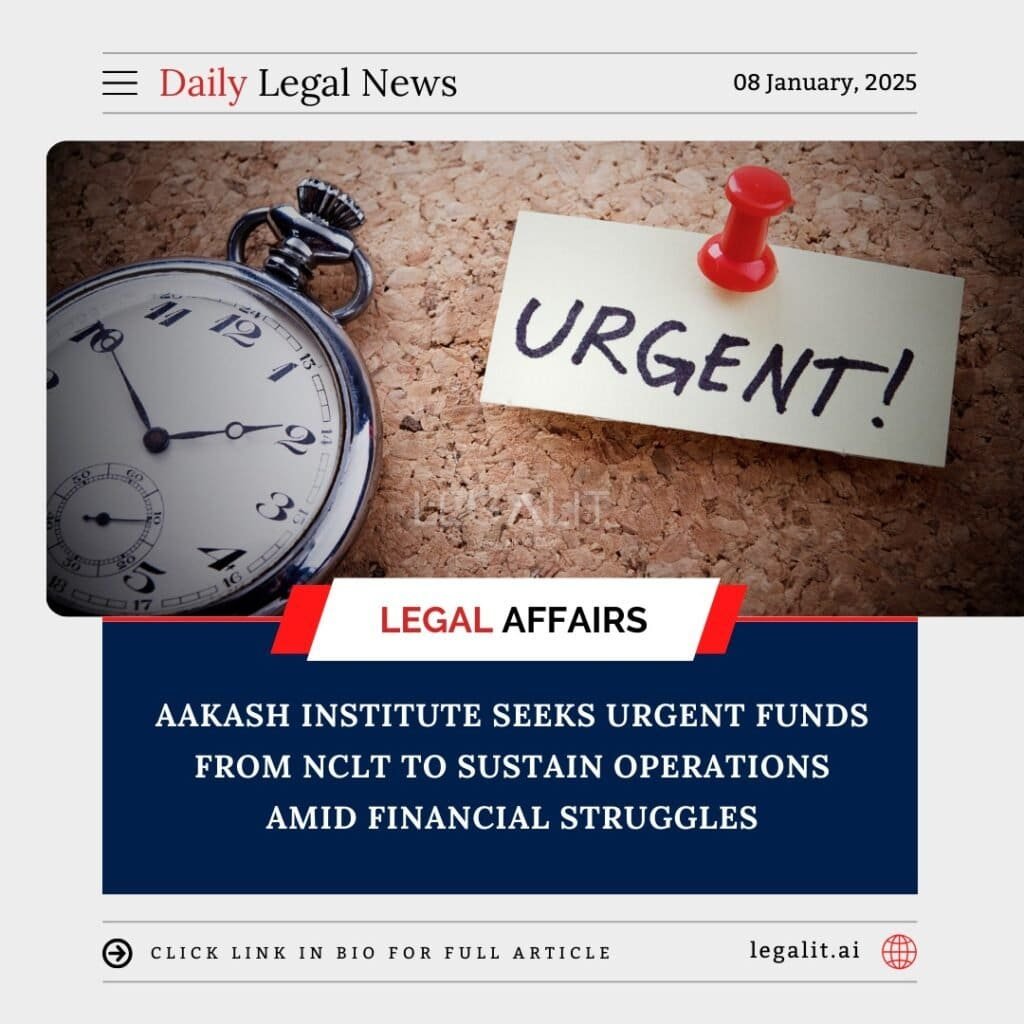
Aakash Institute, one of India’s prominent educational coaching institutes, has approached the National Company Law Tribunal (NCLT) with an urgent request for funds to sustain its operations. The institute, known for its preparation courses for competitive exams like JEE and NEET, has claimed that without immediate financial assistance, it faces the risk of shutting down its services. This plea highlights the challenges faced by educational institutions, especially during times of financial distress, and raises questions about the stability of the education sector amidst ongoing economic pressures.
Background of the Case
Aakash Institute, established as a leading name in the coaching industry, has been facing significant financial difficulties in recent months. The institution has been impacted by various factors, including increased operational costs, declining enrollments, and the financial strain caused by the COVID-19 pandemic. As a result, Aakash has struggled to maintain its cash flow and meet its financial obligations.
In a bid to prevent the closure of its operations, the institute has turned to the NCLT for help, citing the urgent need for funds to continue providing education services. Aakash Institute is requesting financial assistance through a restructuring plan or an emergency loan arrangement to ensure it can stay afloat while it works on improving its financial position.
The institute’s plea has brought attention to the vulnerability of educational institutions that are heavily dependent on student enrollments and fee payments, making them susceptible to market fluctuations and external pressures.
The Institute’s Plea for Financial Assistance
In its application before the NCLT, Aakash Institute has emphasized the critical nature of the situation, explaining that without immediate financial relief, it would be unable to continue its day-to-day operations. The institute has highlighted its role in preparing students for some of India’s most competitive exams and argued that any disruption in its services would severely impact the educational prospects of thousands of students.
The plea includes a request for emergency funds, either through a loan or a restructuring of its current debt. The institute has also proposed that the NCLT intervene and facilitate a repayment plan that could help it get back on track financially. Aakash Institute’s management is hopeful that with a temporary cash infusion, it will be able to stabilize its finances and continue offering coaching services to students across the country.
The NCLT’s Role in the Case
The NCLT, as the regulatory body overseeing corporate insolvency and bankruptcy proceedings in India, plays a key role in cases involving the financial restructuring of companies. In this case, the tribunal will assess the financial health of Aakash Institute, considering its debts, assets, and ability to repay creditors. The NCLT will also review the urgency of the situation and decide whether to grant the institute the requested relief.
The tribunal could approve an interim loan or a debt restructuring plan to ensure the continued operations of the institute. It may also appoint a professional to evaluate the institute’s financial status and determine whether the business can recover with financial assistance or if further restructuring is necessary.
Implications of the Case
1. Challenges in the Education Sector
The case highlights the growing financial pressures faced by educational institutions, particularly those offering coaching services for competitive exams. It underscores how external factors, such as economic conditions and disruptions like the pandemic, can have a significant impact on the sustainability of educational businesses.
2. Corporate Restructuring and Education
This case may set a precedent for how educational institutions handle financial distress and corporate restructuring. It brings to light the complexities of managing financial crises in the education sector, which often operates on a tight revenue model dependent on enrollments and tuition fees.
3. Financial Stability in Times of Crisis
The case also serves as a reminder of the importance of financial stability for educational institutions, particularly in times of crisis. It stresses the need for robust financial planning and risk management strategies to protect against unforeseen challenges and ensure business continuity.
Conclusion
Aakash Institute’s plea for urgent funds before the NCLT underscores the financial difficulties faced by educational institutions, particularly those reliant on student enrollments and fee structures. As the tribunal considers the request, the outcome could have significant implications for the education sector, especially in how businesses in this field manage financial stability and crisis situations. If granted the necessary relief, the case could provide a model for other educational organizations facing similar challenges.